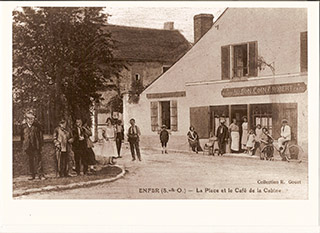Prochain point : lat="" lon=""
THE SHOPS OF ENFER
A hamlet with a once vibrant economy
A great range of professions...
Before the widespread use of cars, villages had many local shops and craftspeople. Construction materials were extracted and made locally (in quarries, brick manufacturers, tile factories and lime kilns); many jobs were linked to the agricultural sector (such as wheelright, saddler, blacksmith, farrier etc.) and agricultural products were processed locally (in mills, distilleries, sugar refineries and by farming cooperatives).
In 1836, Wy-dit-Joli-Village had numerous farm workers, a farrier-blacksmith who looked after horses and repaired farming tools, nine weavers, three coopers, three cobblers, three hatters, a saddler and a clogmaker. There were three multipurpose cafés in this hamlet: the Bellencontre café (6 place des Magnan) which had one of the first telephones in the village; the Geslin café (10 rue Charles de Hazeville) and another at 2 rue Pierre Fontaine.
…and extensive agriculture
Many of the jobs linked to farming, such as wheelright, saddler, farrier and blacksmith have now disappeared. A collection of 1,500 tools representing these professions as well as objects from home life are on display at the
Musée de l’Outil (Tool Museum) next to the church. Agriculture is still an essential activity in Wy-dit-Joli-Village. It no longer employs as many workers, but still takes up a large proportion of land (around 80% in 2020). A cattle farmer who worked in the commune since the fifties, opened a butcher’s shop in 1977, the only shop still operating in the commune in 2020.




